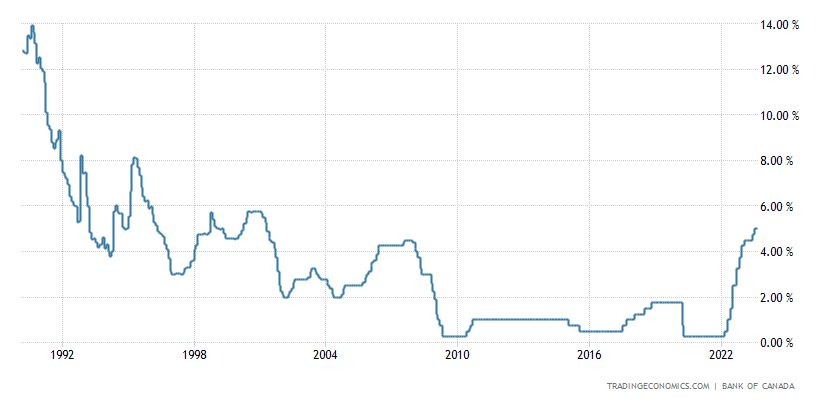Three Most Important Statements From the Bank of Canada
The three most important statements in the Bank of Canada’s September 6, 2023 interest rate decision press release were:
1. Wage growth has remained around 4% to 5% [above the 3% target]
2. Year-over-year and three-month measures of core inflation are now both running at about 3.5%, indicating there has been little recent downward momentum in underlying inflation. The longer high inflation persists, the greater the risk that elevated inflation becomes entrenched, making it more difficult to restore price stability.
3. Governing Council remains concerned about the persistence of underlying inflationary pressures, and is prepared to increase the policy interest rate further if needed
These three statements indicate that the Bank of Canada will not be decreasing rates in a hurry without data giving reason.
As mentioned in my previous article, I didn’t believe that the Bank of Canada (BoC) SHOULD increase interest rates but instead believed that they WOULD increase rates.
I was proven wrong. After publishing my August article, some new data came out which caused a moderation of the expectation.
Here’s what changed according to the BoC:
1. Canadian GDP output contracted by 0.2% at an annualized rate in the second quarter.
2. Global growth slowed in the second quarter of 2023, largely reflecting a significant deceleration in China
3. Weakness in the property sector undermining confidence, growth prospects in China have diminished
Bank of Canada Overnight Rate

It is safe to say that we are in sufficiently restrictive territory from a monetary perspective. Interest rates and shrinking the Bank’s balance sheet is restricting lending.
The odd thing is that interest rates rose after the announcement. The announcement was at 10am and by noon, Canadian bond yields had gone UP.
This is not what most would expect. This could cause mortgage rates and loan rates to increase further.
The reason being is that the statements on why interest rates need to remain here are likely stronger than the market expect.
Notice that the 10 & 20 year bond is mostly unchanged with the 30 year bond down slightly.

Bottom line
The BoC is losing credibility
This is likely the part where the Bank of Canada loses credibility. I don’t think that they can get inflation down to 2% without causing some serious economic damage.
This means that rates will likely higher than needed. This will result in a reversal at some point in the near future. My guess is that in 9 months from now, the BoC will have to start to look at decreasing interest rates.
I think they will remain overly focused on inflation data and ignore the signs that underpin inflation:
Mortgages are renewing and people are struggling - This takes time
- Not all people will struggle
- Not all people have mortgages
As per Equifax:
- Only 5.72% of all mortgages are variable rate mortgages that change payments based on the prime lending rate
Other cool info:
- 35% of houesholds have a mortgage
- 28.6% of all mortgages are variable, equating to 10% of Canadian households
- Only 20% of the variable rate mortgages have variable payments (5.72% of all mortgages)
This means that the effect of increasing interest rates has a very slow process of impacting the economy.
With only about 17% of mortgages coming due each year, this will take longer than many expect.
Beware of the Mortgage Prepayment Penalty
Most people take a mortgage with a Canadian bank.
If you take a fixed rate mortgage, they have some of the most punitive mortgages on the market.
Their prepayment penalty, aka Interest Rate Differential (IRD), is based off of the posted rate at the time you took out your mortgage.
Very few mortgages in Canada are issued at the posted rates and are usually issued for much lower rates.
This means that if you break your mortgage that the prepayment penalty will be much larger than if you had been charged using a calculation using your actual mortgage rate.
As we look forward to a decreasing interest rate environment, becareful of the which lender you go with and know their Interest Rate Differential calculations.
Conclusion
While I expected the Bank of Canada to increase rates, there was no signal that they are in a hurry to decrease rates.
Going forward I expect the Bank of Canada to be fairly data dependent. I believe that parsing the data and looking for moderating inflation versus poor economic output will be difficult.
We’ve also seen inflation rebound a bit in August with some commodity prices such as oil on an upward trend.
I don’t think we need to have advanced economic degrees to know that holding rates here will do the trick of lowering inflation back to 2% at some point.
It’s inevitable in our opinion and they risk overdoing it.
Next Steps
Here’s what to do about it:
1) Any cash, invest in safe but high yielding investments. Make sure they are liquid. (ask us how)
2) Be sure to negotiate any mortgage renewal rates (ask us how)
~ Check out our mortgage renewal calculator: HERE
3) Be spending aware and make sure that every dollar has a purpose (ask us how)
Until next time,
Trevor
___________________________________________________
Trevor Dale, CFA
CEO, TK Dale Wealth Inc.
Portfolio Manager, TK Dale Wealth Management Inc.
Life Insurance Agent, TK Dale Wealth Insurance Inc.
Mortgage Broker, TK Dale Wealth Mortgages Inc. Lic. #13359
#7-17075 Leslie St., Newmarket, ON L3Y 8E1
*Disclaimer: Please note that this communication contains forward looking information. We do not guarantee or warrant these statements and cannot guarantee that the outcomes will occur. This is not individual advice and you should seek the help of a licensed professional. This is not intended to solicit residents outside of Ontario, Canada. We do not provide tax or legal advice. Securities mentioned in this communication are not recommendations. We do not endorse nor recommend any securities mentioned. This is not financial advice. We recommend seeking the help of a licensed professional prior to making investment and financial decisions.

